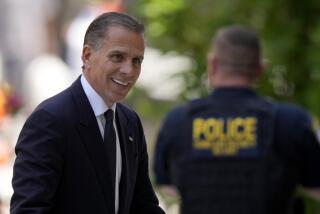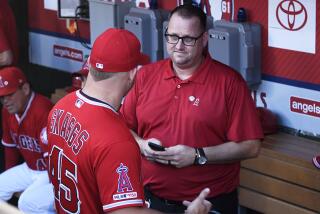Bonds trial is delayed
- Share via
SAN FRANCISCO — On the eve of jury selection, federal prosecutors announced Friday they would appeal a judge’s ruling to exclude key evidence in the perjury trial of former San Francisco Giants slugger Barry Bonds, a move that is expected to delay Bonds’ trial by several weeks or even months.
Prosecutors are appealing a decision by U.S. District Court Judge Susan Illston to exclude documents and drug tests linking Bonds to banned-drug use unless his former trainer, Greg Anderson, confirms in testimony that the evidence involved Bonds. The appeal will give prosecutors more time to try to press Anderson to testify and possibly gather more evidence against Bonds.
Anderson, summoned by Illston, told her Friday he would not testify. “There is no question in his mind that he will appear whenever ordered to, but he is not going to testify,” Mark Geragos, his lawyer, told the court.
Illston told Anderson she would have to order him to testify, and, because he would be given immunity for his testimony, “there won’t be any right left not to testify.” She said she would have to find him in civil contempt of her order and put him behind bars until the trial ended.
“You would be in contempt of my order and I would send you to custody to give you an opportunity to change your mind,” said Illston, a Clinton appointee known for a strong intellect and evenhanded style.
Defense lawyers argued that Illston should dismiss the case and permit prosecutors to appeal both her exclusion of evidence and the dismissal together. Instead, Illston’s clerk issued a brief order announcing that jury selection, expected to commence Monday, would not proceed until further notice.
Laurie Levenson, a professor at Loyola Law School and a former federal prosecutor, said federal judges rarely throw out evidence for the reasons Illston cited because “there are so many ways to authenticate evidence.” But because Illston is well-respected and has wide discretion in such matters, the government faces “an uphill battle” before the U.S. 9th Circuit Court of Appeals, Levenson said.
She said the appeal, which also is rare, demonstrates that the prosecution “really needs this evidence.
“It doesn’t mean they cannot convict him without it, but it will be tough,” she said.
During Friday’s hearing, a federal prosecutor asked Illston to advise Anderson that he could be subject to criminal contempt as well as civil contempt. Criminal contempt could mean a much longer prison sentence. Illston said criminal contempt was “possible” but indicated that civil contempt was the pressure she intended to use when the trial began.
Illston also said she would hear arguments from Geragos about why Anderson should not be imprisoned and arguments from the defense that Anderson should not even take the stand, where he would have to refuse to testify in front of the jury.
Anderson already has spent a year in prison for refusing to cooperate with prosecutors, and the federal government has told his wife she is the target of a conspiracy investigation and has investigated his mother-in-law for possible financial improprieties.
Geragos said outside court that Anderson would end up spending about 10 days in prison during the trial, and there was nothing more the government could do to change his client’s mind, adding, “They have tried everything already.”
The government wants Anderson to testify about three private steroid tests that allegedly showed drugs in Bonds’ system in 2000 and 2001, just before Bonds broke the season home run record in 2001.
Bonds is charged with perjury and obstruction of justice stemming from testimony he gave a grand jury in 2003 that he never knowingly used banned drugs.
Illston’s ruling eight days ago was a major defeat for the prosecution, excluding evidence, including doping calendars, that indicated Anderson was giving Bonds banned substances. The government seized the evidence in 2003 from the Bay Area Laboratory Co-Operative of Burlingame, known as BALCO, and Anderson’s home.
Prosecutors had hoped to link the drug tests to Bonds with testimony from a BALCO employee that Anderson told him the urine samples were Bonds’. But Illston said that would be impermissible hearsay.
Courts typically exclude hearsay evidence because lawyers are unable to attack the original account and examine the credibility of the person who gave it. Illston ruled that prosecutors had failed to show they could authenticate the evidence without Anderson.
Prosecutors also have evidence that a test by Major League Baseball of Bonds in 2003 revealed banned substances during a retest in 2004. The government has said a witness would testify she saw Anderson inject Bonds. Bonds told the grand jury that Anderson had never given him an injection.
--
Times staff writer Lance Pugmire and librarian Robin Mayper contributed to this report.



